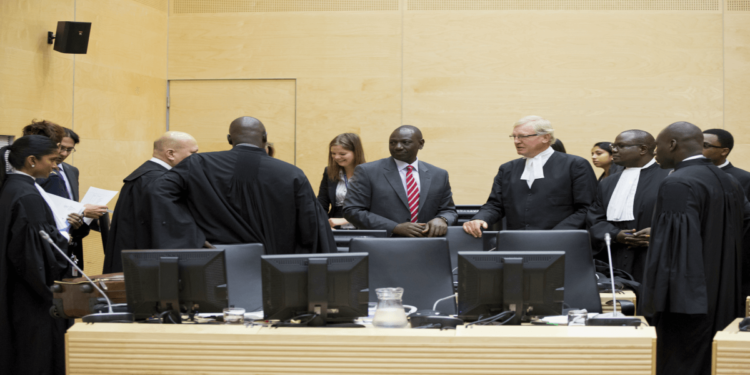By Susan Kendi
Thanks to a document dump by the international Criminal Court (ICC), we are getting firsthand insights into the great lengths to which the Court went to protect witnesses in the collapsed case against Deputy President William Ruto and journalist Joshua Sang. Almost two years since the ICC abandoned its prosecution of the pair, Journalists for Justice (JFJ) has painstakingly pored through the documents released by the Office of the Prosecutor (OTP) to sieve out the gems.
This is the second part in a series of articles that will piece together the disparate shards of information from the documents recently released by the ICC. The first piece in the series can be read here. Once complete, (we hope) the series will give readers some measure of the enormous challenges faced by the prosecutor in the Ruto/Sang case and how they eventually led to the case’s termination.
Today’s piece explores how judges in the Ruto and Sang case allowed the defence to know of the existence of a witness with potentially exonerating evidence.
A former prosecution witness, P-534, who was in possession of information that could have helped exonerate William Ruto and Joshua Sang, refused to consent to his identity being revealed to defence teams and also rejected an offer to be “externally relocated” by the ICC’s Victims and Witnesses Unit (the ‘VWU’), Journalists for Justice (JFJ) has learned. VWU considered the witnesses’ relocation necessary to protect him and ensure his safety once his identity was revealed.
Documents released by the ICC reveal that in June 2014, the Office of the Prosecutor (OTP) requested the court’s guidance on how to proceed on the delicate matter regarding Witness P-534. The Prosecutor’s office also suggested that a status conference involving them and VWU be held in case the judges needed additional information before making its decision.
The judges identified that that the court had been presented with a ‘dual problem’ as defined by Trial Chamber I. A ‘dual problem’ emerges when there is a strain between ‘the need to ensure that all relevant exculpatory evidence is served on the accused and the need to ensure that victims and witnesses are properly protected.’
The Trial Chamber V(a) issued directions on how the prosecution should proceed on the matter, by directing that the only revised redactions allowed, are for the categories of the redaction protocol that they had agreed on and the identity of the subjects of any investigation.
By a majority decision, judges Olga Herrera Carbuccia and Robert Fremr ordered that the identity of Witness P-534 be disclosed to the Defence. Judge Eboe-Osuji partly dissented. The Court ordered also the VWU to take the suitable protective measures to secure the witness’ safety.
“As set out in the Provisional Direction, the Majority considers that the only fair way to proceed in these circumstances is for Former Witness 534’s identity to be disclosed and for the VWU to continue working with him as appropriate to ensure that the potential impact of this disclosure on his safety is mitigated to the extent possible.”
On June 11, 2014, the Victims and Witnesses Unit submitted to the Court that revealing the identity of Witness P-534 as requested by the Defence, may give rise to unmanageable levels of risks for the witness, his family and community. They further stated that his involvement with the ICC should be taken into consideration.
In their submissions to the court, the prosecution stated that they had no further submissions and were prepared to comply with the chambers instructions on disclosing the identity of former Witness P- 534.
The chamber declined to amend its previous decision, although the Defence made submissions that the redacted information in some of the relevant materials was important for their investigations.
Taking into consideration the concerns of the prosecution and VWU’s in relation to the risk to Witness P-534 should his identity be disclosed, the majority of the bench however, found it important for the Defence to get the particular information they had requested.
In accordance with Article 68(1) of the Rome Statute, the Chamber has to balance its obligation to ‘take appropriate measures to protect the safety, physical and psychological well-being, dignity and privacy of victims and witnesses’ with its duty to ensure that measures for protection ‘shall not be prejudicial to or inconsistent with the rights of the accused and a fair and impartial trial’.
The majority felt that the only fair way to progress was for the identity of the witness to be disclosed as the VWU worked on the best measures possible, to ensure that the safety of the witness was safeguarded. The Chamber also requested the prosecution to assign pseudonyms and prepare an accompanying code sheet for the names and sources of the Article 70 investigation.
Bearing in mind the security concerns raised and the observations of the Victims and Witness Unit, the Majority ordered the defence not to directly or indirectly disclose the identity of Witness P-534 to the public or his involvement with the activities of the Court.
The judges also prohibited the prosecutor from making any enquiries or conducting any investigations amongst Former Witness P-534’s family, friends and associates, present or past. In case the Defence team found it essential to conduct investigations which would have the potential to reveal Witness P-534’s involvement with the Court, the judges ordered that in such circumstances, the lawyers for Ruto and Sang would first have to seek the Chamber’s approval.
“Should the Defence consider it necessary to conduct investigations which have the potential, in any way, to reveal Former Witness 534’s involvement with the Court, even indirectly, it shall request prior authorisation of the Chamber.”
ICC judges, citing insufficient evidence, terminated the Ruto-Sang case on 5th April 2016. While throwing out the case, the judges stressed that the prosecutor had faced unprecedented challenges shielding witnesses from attempts to corrupt them through bribes and coercion. The Chamber also made it clear that the case could be prosecuted afresh in future.







